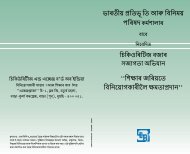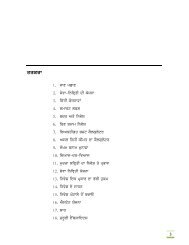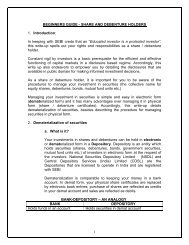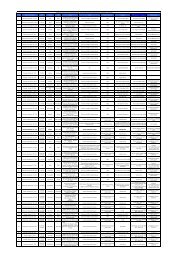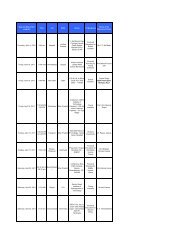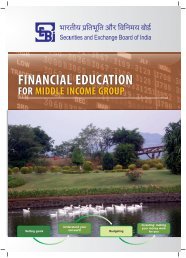financial planning 3. - Securities and Exchange Board of India
financial planning 3. - Securities and Exchange Board of India
financial planning 3. - Securities and Exchange Board of India
- No tags were found...
Create successful ePaper yourself
Turn your PDF publications into a flip-book with our unique Google optimized e-Paper software.
5.SAVINGS & INVESTMENTFinding the Right Balance between Saving <strong>and</strong> InvestingSaving <strong>and</strong> investing are two related, but independent, processes. Saving is the process <strong>of</strong>putting hard cash aside <strong>and</strong> parking it in extremely safe <strong>and</strong> liquid accounts such as Banksavings accounts. Investing is the process <strong>of</strong> using money (called capital) to buy an asset thatyou think will generate a safe <strong>and</strong> acceptable return over time, making you wealthier witheach passing year. When you save, you’re preserving your money for a later time. When youinvest, you’re taking some risk that you believe will make it possible for your investment togrow in value over time. While investing can help you achieve your long-term goals, saving isan effective way <strong>of</strong> managing your money to meet short-term needs <strong>and</strong> to provide a safetynet for emergency expenses. When saving money, the primary emphasis is on the stability<strong>of</strong> the principal rather than return potential. On the other h<strong>and</strong>, investors are generally morewilling to risk their principal investment for the potential <strong>of</strong> higher returns.6.LOANS vs. INVESTMENTThere is a general confusion among people whether they should avail a loan or buildinvestments to achieve their <strong>financial</strong> goal (for example, daughter’s marriage). There is no rulewhich says that either <strong>of</strong> the option is good, because it differs for each person’s capacity <strong>and</strong>the nature <strong>of</strong> debt or investment. The following points are worth remembering:• It purely depends on your <strong>financial</strong> strength <strong>and</strong> other factors.• Credit card debts <strong>and</strong> personal loans are very costly.• If you have a loan with a low interest rate <strong>and</strong> tax benefits as in the case <strong>of</strong> home loans, it isadvantageous to go for a loan. If you have an investment plan where you can make goodreturn, then you may opt for investment.• You have to be sure that the investment is not risky <strong>and</strong> will not affect your family if youlose the money. For example, you are investing huge sums in share market, instead <strong>of</strong>closing the existing debts, that is very risky.7.PERSONAL BUDGET CALCULATORHave a budget. Determine what you actually spend each month. There are fixed expenseslike rent, loan repayments, etc. every month about which we can do little. The variable itemssuch as food, clothing <strong>and</strong> entertainment are <strong>of</strong>ten what get money away from us. Use yourdiscretion to contain these variable expenses to start saving.10




